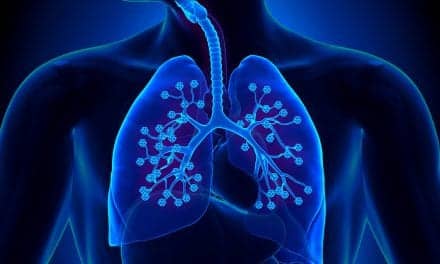Researchers at National Jewish Health have discovered a new genetic variation that increases the risk of developing pulmonary fibrosis by 7 to 22 times. The findings, published in the New England Journal of Medicine, show that nearly two thirds of patients with idiopathic pulmonary fibrosis (IPF) or familial interstitial pneumonia (FIP) carry the genetic variation, which is associated with the MUC5B gene which codes for a mucus-forming protein.
Research into pulmonary fibrosis has been quite difficult. Little is understood about the biological roots of the diseases, and recent clinical trials of several experimental medications have failed to effectively treat them. Previous research has focused primarily on the scarring and inflammatory processes evident in the disease.
In this study, funded by the National Heart, Lung, and Blood Institute, the researchers took an “agnostic” approach, statistically analyzing the entire genome of 82 afflicted families. They found an association with the diseases in a region of chromosome 11 that contains four mucin genes involved in the production of mucus. They narrowed their search using fine mapping, then sequencing, to eventually find a common variation near the MUC5B gene, presumably in a regulatory element, that is strongly associated with the disease.
“This research suggests that mucus production where the small airways and the air sacs converge may play a significant role in pulmonary fibrosis,” said David Schwartz, MD, senior author and chair of the department of medicine at the University of Colorado School of Medicine and director of the Center for Genes, Environment, and Health at National Jewish Health.
The variation exists in 19% of healthy controls, 59% of FIP patients, and 67% of IPF patients. Carrying one copy of the gene increases the risk of developing familial pulmonary fibrosis (FPF) by 6.8 times, and IPF by 9.0 times. Carrying two copies of the variation increases risk 20.8 times and 21.8 times, respectively.
The researchers discovered that the genetic variant increases production of MUC5B more than thirtyfold in unaffected patients. They also found that MUC5B production is elevated in pulmonary fibrosis patients both with and without the gene.
“There are several biologically plausible ways in which excess mucus could cause disease,” said Schwartz. “We are currently investigating all of these mechanisms as potential causes of disease.”
Mucus is a vital part of lung biology, protecting delicate cells from direct exposure to inhaled irritants and toxins, and helping to clear them from the lungs. The researchers hypothesize that excess mucus production caused by the MUC5B variant could slow clearance of mucus contaminated with irritants and toxins. Excess mucus might also interfere with repair of air sacs damaged by these contaminants. Another scenario suggests that the genetic variation could trigger the production of mucus in areas where it is not normally present.
Source: National Jewish Health









